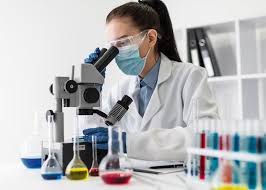
Diploma in Clinical Pathology Technician (2-Year)
🎓 Diploma in Clinical Pathology Technician (2-Year)
First Year Subjects
1. Human Anatomy & Physiology
Theory:
- Introduction to human body: Levels of organization
- Structure and function of:
- Skeletal system
- Muscular system
- Cardiovascular system
- Respiratory system
- Digestive system
- Urinary system
- Nervous system
- Endocrine system
- Reproductive system
- Blood composition and functions
- Sense organs (eye, ear, nose, tongue, skin)
Practical:
- Identification of organs using models
- Study of blood pressure, pulse, temperature
- Microscopy of tissues
2. General Pathology & Clinical Pathology
Theory:
- Definitions: Health, disease, pathology, etiology
- Cell injury, inflammation, necrosis, gangrene
- Wound healing and repair
- Degeneration and regeneration
- Collection and preservation of clinical specimens
- Physical, chemical, and microscopic examination of:
- Urine
- Stool
- Sputum
- CSF
- Semen
- Synovial and pleural fluids
Practical:
- Urinalysis (physical, chemical, microscopic)
- Stool examination (ova, cyst, parasites)
- Semen analysis
- CSF analysis
- Sample collection procedures
3. Basic Biochemistry
Theory:
- Introduction to biochemistry and lab safety
- Carbohydrates: types, functions
- Proteins: structure, functions
- Lipids: classification and functions
- Enzymes: functions and diagnostic importance
- pH, buffer systems, acid-base balance
Practical:
- Blood glucose estimation (manual & automated)
- Protein and urea tests
- pH testing
- Use of colorimeter and spectrophotometer
4. Microbiology & Parasitology
Theory:
- Introduction to microorganisms: Bacteria, viruses, fungi
- Classification and structure of bacteria
- Sterilization and disinfection
- Immunity: types, immune response
- Introduction to parasites: malaria, amoebiasis, etc.
Practical:
- Gram staining, acid-fast staining
- Culture media preparation
- Identification of bacteria using microscopy
- Detection of intestinal parasites in stool
5. Hematology
Theory:
- Composition and function of blood
- RBC, WBC, platelet structure and function
- Hemoglobin and its estimation
- Blood indices (MCV, MCH, MCHC)
- Coagulation and bleeding disorders
- Anticoagulants used in hematology
Practical:
- Hemoglobin estimation (Sahli’s/Colorimetric method)
- RBC, WBC, and platelet counts (manual)
- Blood film preparation and staining
- Differential leukocyte count (DLC)
6. Communication Skills & Medical Ethics
Theory:
- Basics of communication: verbal & non-verbal
- Patient interaction and behavior
- Medical ethics and code of conduct
- Confidentiality and consent
- Biomedical waste disposal
- Personal hygiene and infection control
Second Year Subjects
1. Clinical Biochemistry
Theory:
- Liver function tests (LFT)
- Renal function tests (RFT)
- Blood sugar (FBS, PPBS, RBS)
- Lipid profile: cholesterol, triglycerides
- Serum electrolytes: Na⁺, K⁺, Cl⁻, HCO₃⁻
- Enzymes: ALT, AST, ALP, Amylase
Practical:
- Performing LFT, RFT, lipid profiles
- Use of semi-auto and fully auto analyzers
- Preparation of reagents and quality control
2. Histopathology & Cytopathology
Theory:
- Tissue processing: Fixation, dehydration, embedding
- Microtomy: sectioning and slide preparation
- Staining methods: Hematoxylin & Eosin (H&E), PAS, etc.
- Pap smear, fine-needle aspiration cytology (FNAC)
- Cytology of fluids
Practical:
- Fixing and embedding tissues
- Operating microtome
- Staining techniques (H&E)
- Cytology smear preparation
3. Advanced Microbiology & Immunology
Theory:
- Pathogenesis and diagnosis of infections (TB, HIV, Hepatitis)
- Immune system: cells, organs, antigen-antibody reactions
- Serological tests: ELISA, Widal, VDRL
- Antibiotic sensitivity testing
- Fungal and viral infections overview
Practical:
- Culture techniques: streaking, incubation
- Serological testing: Widal, VDRL
- Identification of microbes from cultures
- Sensitivity tests (antibiotic discs)
4. Blood Banking & Transfusion Medicine
Theory:
- Blood group systems (ABO & Rh)
- Cross-matching techniques
- Blood component separation
- Screening of donor blood (HIV, HBsAg, HCV)
- Storage and preservation of blood
- Transfusion reactions and their management
Practical:
- Blood grouping (slide & tube method)
- Cross matching (major & minor)
- Screening donor blood for TTIs
- Operation of centrifuge for component separation
5. Clinical Pathology (Special Fluids)
Theory:
- Physical, chemical, and microscopic analysis of:
- Pleural fluid
- Peritoneal fluid
- Synovial fluid
- CSF
- Semen
- Importance in disease diagnosis
- Reporting and reference ranges
Practical:
- Collection & handling of body fluids
- Microscopic examination (cells, crystals, organisms)
- Sperm motility and morphology
- Total and differential cell counts in fluids
6. Internship / Project Work
- Duration: Minimum 3 months
- Rotations in: Clinical Pathology, Biochemistry, Microbiology, Hematology, Histopathology
- Training Focus:
- Routine lab work
- Sample processing
- Reporting under supervision
- Logbook Maintenance: Mandatory
- Final Viva/Presentation: Based on project or internship experience

